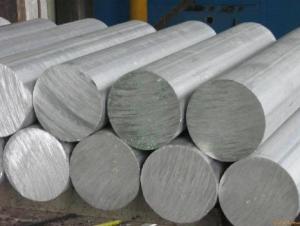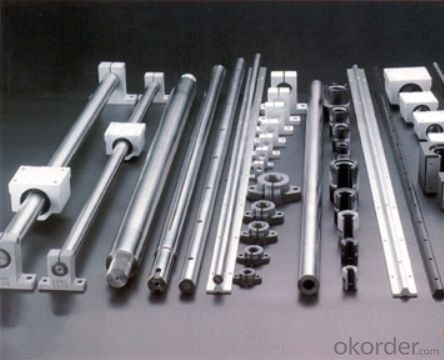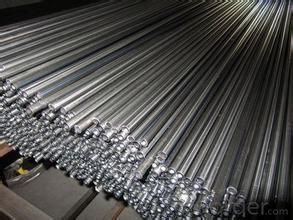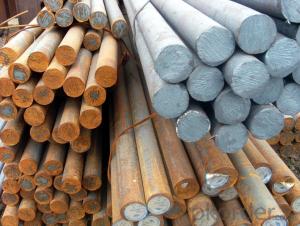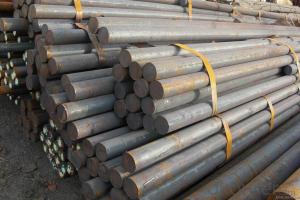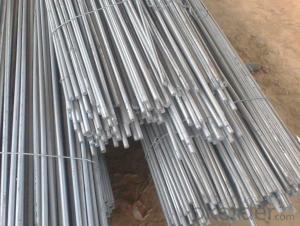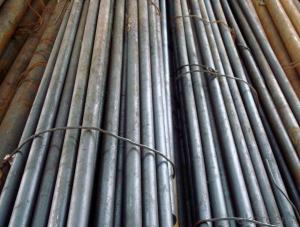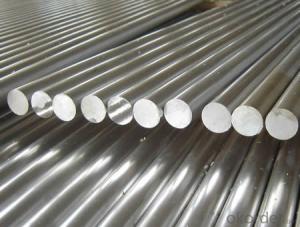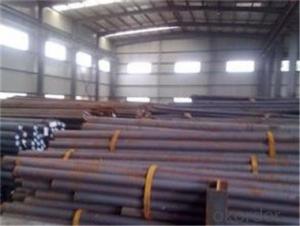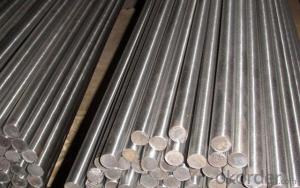Hot Rolled Spring Steel Round Bar 18mm with High Quality
- Loading Port:
- Shanghai
- Payment Terms:
- TT or LC
- Min Order Qty:
- 20 m.t.
- Supply Capability:
- 500 m.t./month
OKorder Service Pledge
OKorder Financial Service
You Might Also Like
Product Description:
OKorder is offering Hot Rolled Spring Steel Round Bar 18mm with High Quality at great prices with worldwide shipping. Our supplier is a world-class manufacturer of steel, with our products utilized the world over. OKorder annually supplies products to European, North American and Asian markets. We provide quotations within 24 hours of receiving an inquiry and guarantee competitive prices.
Product Applications:
Hot Rolled Spring Steel Round Bar 18mm with High Quality is widely used to make the bearing used in automobile, tractor engine, transmission and the wheel. And it also used to make the main bearing for the machine tools, electrical machinery, mining machinery, electric locomotives,mechanical ventilation and high speed of grinding wheel spindle etc
Product Advantages:
OKorder's Hot Rolled Spring Steel Round Bar 18mm with High Quality are durable, diversified and qualified.
Main Product Features:
· Premium quality
· Prompt delivery & seaworthy packing (30 days after receiving deposit)
· Can be recycled and reused
· Mill test certification
· Professional Service
· Competitive pricing
Product Specifications:
Manufacture: Hot rolled
Grade: 20CrNiMoA 20CrNi2MoA 16Cr2Ni4MoA 12Cr2Ni3Mo5A 20Cr2Ni4A 20Cr2Ni2MoA
Cr4Mo4V Cr15Mo4
Certificates: ISO, SGS, BV, CIQ
Length:6m 8m 9m 12m
Packaging: Packed in bundles with standard export sea-worthy package or as customer require
FAQ:
Q1: How soon can we receive the product after purchase?
A1: Within three days of placing an order, we will begin production. The specific shipping date is dependent upon international and government factors, but is typically 7 to 10 workdays.
Q1: How many types of bearing steel that OKorder.com can supply?
A2: Two types, carbon spring steel and alloy spring steel
Images:
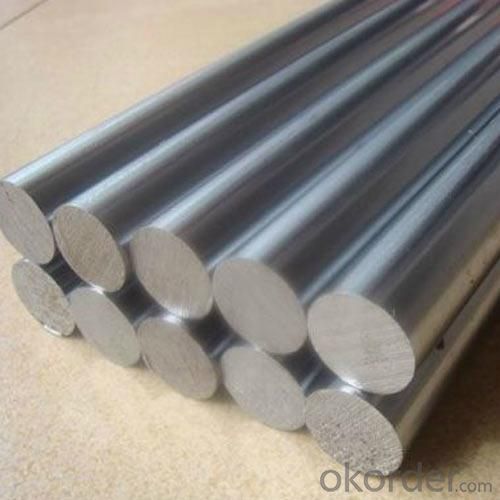
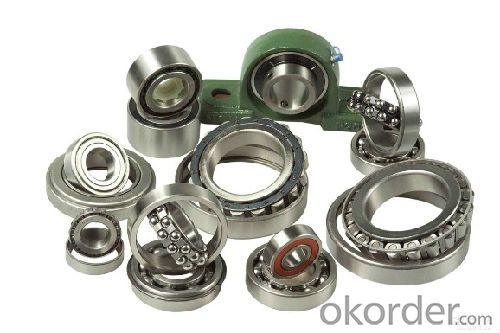
- Q: How does special steel contribute to the machinery manufacturing industry?
- Special steel plays a crucial role in the machinery manufacturing industry by providing high-quality and durable materials for the production of various machine components. This type of steel is specifically engineered to possess exceptional strength, toughness, and resistance to wear, corrosion, and high temperatures. In the machinery manufacturing industry, special steel is utilized in the production of critical components such as gears, shafts, bearings, and cutting tools. These components are subjected to extreme mechanical forces, exposure to harsh environments, and repetitive motion, requiring a material that can withstand such conditions without compromising performance or safety. The exceptional properties of special steel enable machinery manufacturers to produce equipment that is reliable, efficient, and long-lasting. By utilizing this type of steel, manufacturers can enhance the overall performance and durability of their machinery, ensuring optimal functionality and minimizing the need for frequent repairs or replacements. Moreover, special steel allows for the design and production of more compact and lightweight machinery, leading to improved energy efficiency, reduced manufacturing costs, and increased productivity. The high strength-to-weight ratio of special steel enables the production of smaller and lighter components, without sacrificing durability or performance. Furthermore, the corrosion and heat resistance properties of special steel make it suitable for use in industries with demanding operating conditions, such as aerospace, automotive, and energy. It ensures that machinery can withstand extreme temperatures, chemical exposure, and abrasive environments, enhancing safety and reliability. In conclusion, special steel significantly contributes to the machinery manufacturing industry by providing materials with exceptional strength, toughness, and resistance to wear, corrosion, and high temperatures. Its utilization in critical components ensures the production of reliable, efficient, and durable machinery, leading to improved performance, reduced costs, and increased productivity.
- Q: How does special steel contribute to reducing product recalls?
- Special steel contributes to reducing product recalls by offering enhanced strength, durability, and corrosion resistance, thereby ensuring the integrity and reliability of various products. This reduces the likelihood of manufacturing defects, material failures, and premature breakdowns, which are common causes of product recalls. By using special steel in critical components, manufacturers can enhance product performance, safety, and longevity, leading to fewer recalls and improved customer satisfaction.
- Q: What are the main factors affecting the hardness of special steel?
- There are several main factors that influence the hardness of special steel. 1. Carbon content: One of the key factors is the carbon content in the steel. Carbon is a hardening element that increases the strength and hardness of the steel. Higher carbon content typically results in higher hardness. 2. Alloying elements: The presence of alloying elements such as chromium, manganese, nickel, and tungsten also affects the hardness of special steel. These elements form various compounds and solid solutions, which can enhance the hardness and strength of the steel. 3. Heat treatment: The heat treatment process, which involves heating and cooling the steel, significantly impacts its hardness. Quenching, a rapid cooling process, can increase the hardness by transforming the steel's microstructure. Tempering, on the other hand, can reduce hardness while improving toughness. 4. Crystal structure: The crystal structure of the steel can influence its hardness. For example, martensite, a hard and brittle structure formed during quenching, provides high hardness. Other crystal structures like ferrite or pearlite may have lower hardness. 5. Grain size: The size of the grains in the steel's microstructure can affect its hardness. Smaller grain sizes generally result in higher hardness due to improved strength and reduced dislocation movement within the material. 6. Work hardening: The process of plastic deformation, such as rolling or forging, can increase the hardness of steel. This work hardening occurs as dislocations in the crystal lattice get trapped and hinder further dislocation movement, resulting in increased hardness. 7. Impurities and inclusions: The presence of impurities or non-metallic inclusions in the steel can affect its hardness. These impurities can act as stress concentrators and reduce the hardness of the material. It is important to consider these factors and carefully control them during the manufacturing process of special steel to achieve the desired hardness for specific applications.
- Q: What are the different forging grades of special steel?
- There are several different forging grades of special steel, each with its own unique characteristics and applications. Some of the most commonly used forging grades include: 1. Carbon Steel: Carbon steel is a popular choice for forging due to its high strength and durability. It contains various amounts of carbon, which determine its hardness and toughness. Carbon steel forgings are commonly used in automotive parts, construction equipment, and machinery. 2. Alloy Steel: Alloy steel is made by adding various alloying elements to carbon steel, such as manganese, chromium, nickel, or molybdenum. This enhances its strength, corrosion resistance, and wear resistance. Alloy steel forgings are widely used in aerospace, defense, oil and gas, and power generation industries. 3. Stainless Steel: Stainless steel is a corrosion-resistant steel alloy that contains a minimum of 10.5% chromium. It is highly resistant to rust and staining, making it suitable for applications in harsh environments or where hygiene is critical. Stainless steel forgings are commonly used in the food processing, chemical, and medical industries. 4. Tool Steel: Tool steel is specifically designed for use in cutting tools, molds, and dies. It has high hardness, wear resistance, and toughness, allowing it to withstand high temperatures and heavy loads. Tool steel forgings are used in the manufacturing of drills, saw blades, punches, and various precision tools. 5. High-Speed Steel: High-speed steel is a type of tool steel that is capable of cutting at high speeds without losing its hardness. It contains additional elements like tungsten, molybdenum, or vanadium, which improve its heat resistance and wear resistance. High-speed steel forgings are used in the production of cutting tools, drills, and milling cutters. 6. Maraging Steel: Maraging steel is a low-carbon, high-nickel steel alloy known for its exceptional strength and toughness. It is heat-treated to achieve high tensile strength while maintaining good ductility. Maraging steel forgings are commonly used in aerospace, defense, and missile systems. These are just a few examples of the different forging grades of special steel available in the market. Each grade offers specific properties suited to different applications, ensuring that the right material can be selected for the desired performance and durability requirements.
- Q: What are the different certifications available for special steel?
- There are several certifications available for special steel, including ISO 9001, ISO 14001, ISO/TS 16949, and AS9100. These certifications ensure that the steel meets specific quality standards, environmental management practices, automotive industry requirements, and aerospace industry standards, respectively.
- Q: What are the main advantages of using special steel in the defense industry?
- The main advantages of using special steel in the defense industry are its exceptional strength, durability, and resistance to wear and tear. Special steel alloys can withstand extreme conditions, such as high temperatures and pressures, making them ideal for military applications. Additionally, special steel offers enhanced corrosion resistance, ensuring the longevity of defense equipment even in harsh environments. Its high impact resistance and ability to absorb shock also make it valuable in protecting soldiers and military vehicles. Overall, special steel provides crucial advantages in terms of reliability, performance, and protection for the defense industry.
- Q: How does special steel contribute to the transportation equipment industry?
- Special steel plays a crucial role in the transportation equipment industry by providing high strength, durability, and resistance to wear and corrosion. It allows for the construction of lighter yet stronger components, leading to improved fuel efficiency, increased payload capacity, and enhanced safety in vehicles. Additionally, special steel enables the production of precision parts and components, ensuring the reliability and performance of transportation equipment.
- Q: What are the requirements for special steel used in transportation equipment manufacturing?
- The requirements for manufacturing special steel used in transportation equipment are diverse and depend on the specific application. However, there are common requirements that apply universally. First and foremost, transportation equipment requires special steel that is strong and durable. It must withstand the demanding conditions of transportation, including heavy loads, vibrations, and impacts. To ensure the safety and structural integrity of the equipment, high tensile strength and toughness are essential. Secondly, the special steel must have excellent resistance to corrosion. Transportation equipment is exposed to different environmental factors like moisture, salt, chemicals, and extreme temperatures. Corrosion can weaken the steel and compromise the equipment's performance and lifespan. Therefore, it is crucial to use corrosion-resistant special steel to ensure durability and reliability. In addition, the special steel used in manufacturing transportation equipment should be easily weldable and formable. It should be capable of being shaped and joined together efficiently through welding or other methods. This allows for the production of complex structures and components, enabling the manufacturing of transportation equipment with intricate designs and specifications. Furthermore, the special steel should have good resistance to fatigue. Fatigue failure can occur due to repeated loading and unloading cycles, which are common in transportation equipment. The special steel should be able to withstand these cycles without developing fatigue cracks or failing, ensuring the long-term reliability of the equipment. Lastly, special steel used in transportation equipment manufacturing must meet industry standards and regulations. Depending on the specific application and region, there may be legal requirements and safety standards that need to be met. This can include certifications like ISO, ASTM, or other relevant standards to ensure the quality and performance of the steel. In summary, the requirements for special steel used in transportation equipment manufacturing include high strength, durability, corrosion resistance, good weldability and formability, fatigue resistance, and compliance with industry standards. Meeting these requirements is crucial to ensure the safety, reliability, and longevity of transportation equipment.
- Q: What are the different surface treatments applied to special steel?
- There are several different surface treatments that can be applied to special steel to enhance its properties and improve its performance. Some of the commonly used surface treatments include: 1. Heat treatment: This is a process that involves heating the steel to a specific temperature and then cooling it at a controlled rate. Heat treatment can be used to improve the hardness, strength, and toughness of the steel, as well as to enhance its resistance to wear and corrosion. 2. Coating: Coating the surface of special steel with a protective layer is another common surface treatment. This can be done using various methods such as electroplating, hot-dip galvanizing, or powder coating. Coatings can provide additional resistance to corrosion, improve the appearance of the steel, and increase its lifespan. 3. Nitriding: Nitriding is a process that involves diffusing nitrogen into the surface of the steel, typically at high temperatures. This forms a hard surface layer that improves the wear resistance and fatigue strength of the steel, while maintaining the core toughness. 4. Shot peening: Shot peening is a mechanical surface treatment that involves bombarding the steel surface with small spherical particles, typically made of steel or ceramic. This process induces compressive stresses in the surface layer, which improves the fatigue strength and resistance to stress corrosion cracking. 5. Passivation: Passivation is a chemical treatment that is used to remove impurities and contaminants from the surface of the steel, typically by immersing it in an acid solution. This process helps to restore the natural corrosion resistance of stainless steel by forming a protective oxide layer on the surface. 6. Electro-polishing: Electro-polishing is an electrochemical process that removes a thin layer of material from the surface of the steel. This treatment can improve the surface finish, remove micro-roughness, and enhance the corrosion resistance of the steel. These are just a few examples of the various surface treatments that can be applied to special steel. The choice of treatment depends on the specific requirements of the application and the desired properties of the steel.
- Q: How does special steel perform in high-temperature oxidation conditions?
- Special steel, otherwise known as heat-resistant or high-temperature steel, is designed specifically to excel in conditions of high-temperature oxidation. At elevated temperatures, oxidation occurs as a chemical reaction between the metal and oxygen, potentially resulting in the degradation or failure of the material due to the formation of metal oxides. Nevertheless, special steel contains alloying elements that offer exceptional resistance to oxidation. These alloying elements, such as chromium, aluminum, and silicon, create a protective layer of oxides on the steel's surface when exposed to high temperatures. This layer acts as a barrier, preventing further oxidation of the underlying metal. Moreover, the alloying elements can promote the formation of stable and adherent oxide scales, further enhancing the steel's resistance to oxidation. The outstanding performance of special steel in high-temperature oxidation conditions can be attributed to several factors. Firstly, the alloying elements in the steel composition ensure the formation of a protective oxide layer, effectively shielding against further oxidation. Secondly, the steel's microstructure is specifically designed to maintain stability and retain its mechanical properties even at elevated temperatures. In addition, special steel undergoes stringent heat treatment processes to enhance its resistance to high-temperature oxidation. Heat treatment methods such as annealing, quenching, and tempering optimize the steel's microstructure and eliminate impurities, guaranteeing optimal performance in extreme conditions. In summary, special steel showcases remarkable resistance to high-temperature oxidation conditions due to its carefully chosen alloying elements, tailored microstructure, and optimized heat treatment processes. It provides a dependable and long-lasting solution for various industries that require materials capable of withstanding severe oxidation environments, ensuring optimal performance and durability in these challenging conditions.
Send your message to us
Hot Rolled Spring Steel Round Bar 18mm with High Quality
- Loading Port:
- Shanghai
- Payment Terms:
- TT or LC
- Min Order Qty:
- 20 m.t.
- Supply Capability:
- 500 m.t./month
OKorder Service Pledge
OKorder Financial Service
Similar products
Hot products
Hot Searches
Related keywords
